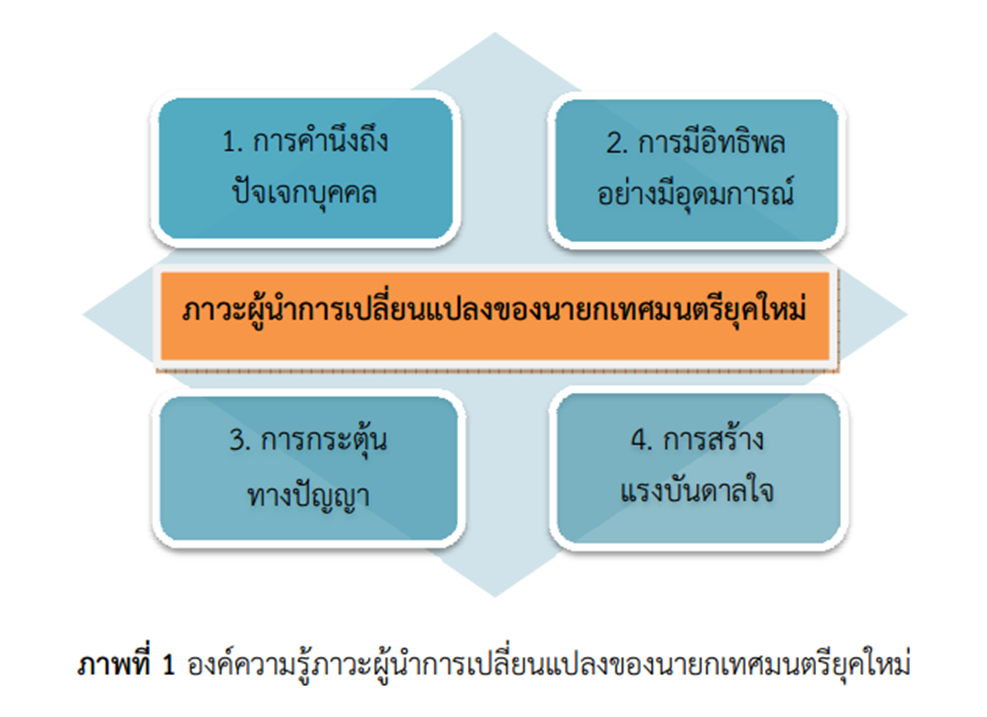TRANSFORMATIONAL LEADERSHIP AND WORK EFFICIENCY OF THE NEW ERA MAYOR
Main Article Content
Abstract
The objectives of the research article were 1) to study transformational leadership of the new era mayor, 2) to compare the level of effectiveness of transformational leadership of the new era mayor, and 3) to study the relationship between transformational leadership and work efficiency of the new era mayor. There were a sample of 276 was drawn based on purposive sampling. The tool using in this research was a questionnaire. The statistics using in the research consisted of percentage, mean, standard deviation and Pearson’s product moment correlation was for hypothesis testing.
The research findings revealed that; 1. the transformational leadership of the new era mayor was at high level overall; when considering in each aspect, it found that the maximum mean score was inspiration, followed by individualized consideration, intellectual stimulation and the lower mean score was idealized influence. 2. Work efficiency of the new era mayor was at middle level overall; when considering in each aspect, it found that the maximum mean score was budget management, followed by environmental, tax concept and the lower mean score was promotion of supplementary occupations. 3. The levels of transformational leadership and work effectiveness were significant at the 0.01 level which are consistent with the assumptions established. Pearson product moment correlation coefficient at the .723 level.
Article Details

This work is licensed under a Creative Commons Attribution-NonCommercial-NoDerivatives 4.0 International License.
References
ปณิสรา ตรัสศรี. (2559). ภาวะผู้นำการเปล่ยนแปลงของผู้บริหารองค์กรปกครองส่วนท้องถิ่นในเขตอำเภอเขาวง จังหวัดกาฬสินธุ์. วิทยานิพนธ์รัฐประศาสนศาสตรมหาบัณฑิต สาขาวิชารัฐประศาสนศาสตร์. บัณฑิตวิทยาลัย : มหาวิทยาลัยราชภัฏมหาสารคาม.
มณีประภา ผิวเงิน. (2557). ความสัมพันธ์ระหว่างภาวะผู้นำการเปลี่ยนแปลงกับประสิทธิผลการบริหารงานขององค์การบริหารส่วนตำบลในเขตจังหวัดสกลนคร. วิทยานิพนธ์รัฐประศาสนศาสตรมหาบัณฑิต สาขาวิชารัฐประศาสนศาสตร์. บัณฑิตวิทยาลัย : มหาวิทยาลัยราชภัฎสกลนคร.
วรรณปกรณ์ สุตคะนา. (2560). รูปแบบการพัฒนาภาวะผู้นำการเปลี่ยนแปลงที่ส่งผลต่อประสิทธิผลในการจัดการศึกษาของผู้บริหารองค์กรปกครองส่วนท้องถิ่นในจังหวัดนครราชสีมา. วิทยานิพนธ์ครุศาสตรดุษฎีบัณฑิต สาขาวิชาภาวะผู้นำทางการบริหารการศึกษา. บัณฑิตวิทยาลัย : มหาวิทยาลัยราชภัฏนครราชสีมา.
วิทยาลัยการเมืองการปกครอง. (2564). ผู้นำยุคใหม่ในระบอบประชาธิปไตย. สืบค้นเมื่อ 28 กันยายน 2564. จาก http://register.kpica.th/course/coursedetail/59
สุรชิน วิเศษลา. (2551). ภาวะผู้นำการเปลี่ยนแปลงของผู้บริหารโรงเรียน สังกัดสำนักงานเขตพื้นที่การศึกษาขอนแก่น เขต 4. วิทยานิพนธ์ครุศาสตรมหาบัณฑิต สาขาวิชาการบริหารการศึกษา. บัณฑิตวิทยาลัย : มหาวิทยาลัยราชภัฏเลย.
Ikujiro Nonaka, Prof. (2015). A virtuous habit of making judgments and taking actions that serve the common good. Retrieved 25 September 2021. From http:// bwww.cgu.edu/pages/1603.asp?EventID=114
Leithwood, K. (1994). The move toward transformational leadership. Educational Leadership. 49(5). 8-12.
Leithwood, K., & Jantzi, D. (2000). Transformational leadership: How principals can help reform school cultures. School Effectiveness and School Improvement. 1(4). 249-280.
Leithwood, K., Jantzi, D., & Femanderz, A. (1994). Secondary school teachers’ commitment to change: The contributions of transformational leadership. Paper presented at the Annual Meeting of the American Educational Research Association. Atlanta, GA.


